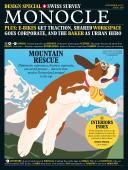
Issue 108
Design special. E-bikes get traction, shared workspace goes corporate, and the baker as urban hero.
In This Issue
Oops! No content was found.
Looks like we no longer have content for the page you're on. Perhaps try a search?
Return Home
Click here to discover more from Monocle

Design special. E-bikes get traction, shared workspace goes corporate, and the baker as urban hero.
Looks like we no longer have content for the page you're on. Perhaps try a search?
Return Home